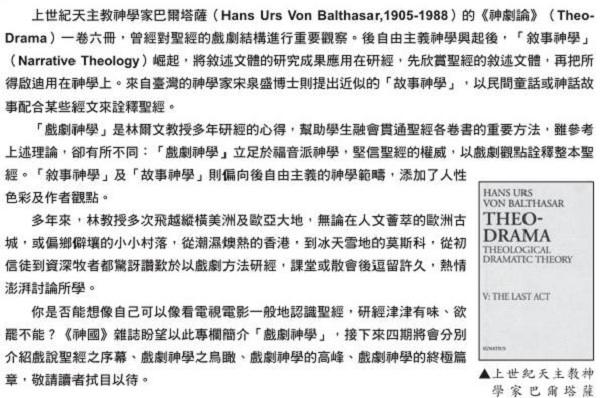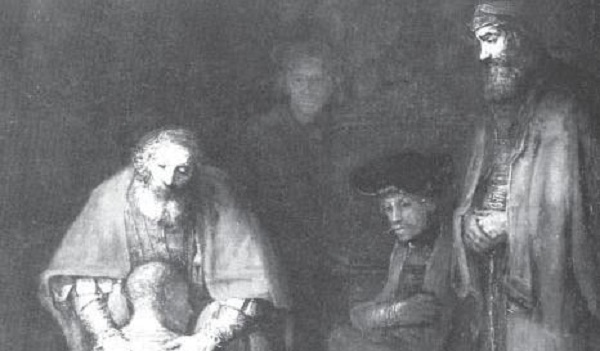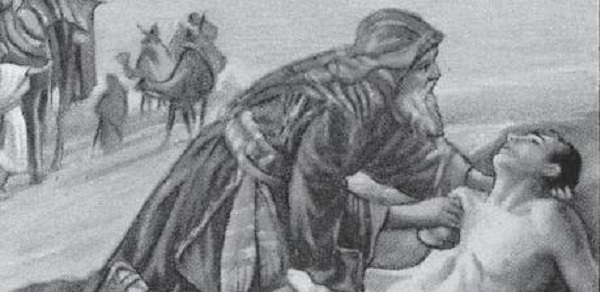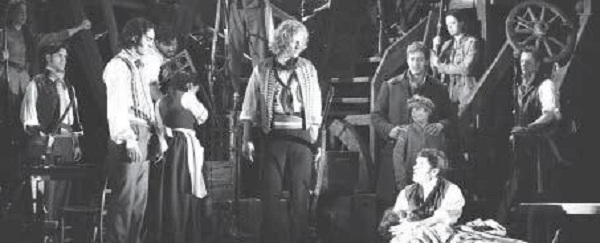Joking about the Bible
【New Generation Bible Study】
Oral guidance/Professor Lin Erwen
Compilation and writing/Pan Xiaomei

"Dramatic theology" is a new systematic theological framework that analyzes the Bible from a dramatic perspective and reinterprets Christian faith.
Its most basic assumption is that the Bible is a normal and complete dramatic work with a single creator...

Essays on the Divine Drama by Hans Urs Von Balthasar, 1905-1988.
New Generation Believers vs. Traditional Theology
He holds a tablet computer, which contains hundreds of videos and thousands of music pieces; he wears headphones to listen to new music introduced by online radio and apps at any time. She gets a headache when she hears "system", but she can organize hundreds of Facebook friends in an orderly manner; she gets sick when she hears "theology", but she is willing to spend an entire weekend handing out sandwiches in slums and playing games with young children. He can kneel down and pray on the stadium with thousands of people watching, and he can wear bracelets, rings, and coffee cups with the title of Jesus generously and loudly, but you may not be able to keep him in the Bible study class. If you keep him, There's no guarantee that he won't fall asleep and yawn mercilessly at you.
She is always thinking hyper-connectedly, jumping from page to page, her mind filled with drama, music, images and videos. He thoroughly enjoyed worship and praise because he could read the melody of music like a migratory bird reading its invisible route southward. She is proficient in Martian literature and can send sixteen text messages to eight friends in one minute. She is a hundred times smarter than us, but she cannot decipher the structure of traditional theology because traditional theology does not speak her language.
Traditional theology divides Christian beliefs into categories: biblical theory, theology, anthropology (sin theory), Christology, soteriology, pneumatology, ecclesiastical theory, and eschatology. It flourished before and after the Reformation and was passed down from generation to generation. It is an integral part of all theology. Basic introduction to the course. It's just that every argument is sanctimonious and heavy. To the new and new mankind, "I'm afraid that it won't be able to carry a boat on the Shuangxi River, and there will be a lot of sorrow." Systematic theology interprets faith in this way. After experiencing a huge communication revolution, it seems that it and the Millennial generation are in two parallel worlds with difficulty in intersecting. The new generation believers have a true love for Christ, but because of this gap, It is difficult to get a glimpse of the whole picture of faith.
Basic Assumptions of Dramatic Theology
How do you explain theology to a new generation of believers?
Question: "Have you seen the American TV series "Grey's Anatomy"?"
(Their eyes lit up and they thought: "Wow, it's unbelievable. The pastor finally said something that I can understand. It's no longer metaphysical, ethereal, and incomprehensible.")
"The Intern" is set in a hospital, with a young female doctor as the protagonist. It describes how a surgeon climbs up the ranks step by step from the beginning of his internship. The plot is compact, twists and turns, and has climaxes one after another. It has been extremely popular since it was aired in 2005. After each season ends, the fans counting the days and waiting for the next season to be released are probably more eager than the believers who are waiting for the return of Jesus!
Do you know who created this play? actor? director? screenwriter? Yes and no. Over the years, "The Internship" has had more than a dozen screenwriters, a string of directors, and countless actors, but its creator (Creator) is named Shonda Rhimes. The show is famous for her The idea was born from scratch. She is the executive producer and part of the writing team. You have never seen her on the screen, but she is the soul of the show from its creation to its completion.
At the end of the eighth season, the heroine's young and sweet half-sister Ellie suffered a plane crash. Although she was inseparable from her boyfriend Dr. Sloan, she could only breathe her last breath on the screen. How many people emptied out the entire box of Kleenex? I can't wipe away the tears in my eyes. With complete immersion in the play, few people have thought that all the plot directions and the power of life and death of the actors are in the hands of the invisible creator Shanda Lime.
"Theology of drama", from a certain perspective, is quite similar to the above description.
"Dramatic Theology" is a new systematic theological framework that analyzes the Bible from a dramatic perspective and reinterprets Christian faith. Its most basic assumption is that the Bible is a normal and complete dramatic work with a single creator. Even though the writing methods and techniques of the writing team and the editing team are intertwined in time and space, the main ideas to be conveyed are still the same. Echoing back and forth, complete and coherent.

▲Set in a hospital, with a young female doctor as the protagonist, "The Intern" describes how surgeons climb up the ranks step by step starting from internship.

▲The power of life and death for actors lies in the hands of the invisible creator.
Just like the scripts of "The Internship" are written by different writers for each episode of each season, but they all take orders from the creator Shanda Lime, so the logic is consistent and the plot is coherent, expounding Shanda Lime's ideas. "Dramatic Theology" assumes that the creator of the Bible is God. The scriptwriting team includes many prophets and apostles who are driven by the Holy Spirit, and the editing team includes countless theologians who obey the Holy Spirit and compile the canon. Because this huge production team that spans time and space obeys the orders of the Holy Trinity, the finished play—the Bible—is finalized by God himself, making it a complete work with a beginning and an end.
Let's use "The Intern" as an analogy: each episode is like a chapter in the Bible, and each season is like a book in the Bible. When you watch a certain episode of a certain season, you may see the name of a specific screenwriter at the beginning and end of the film. But no matter how many years it can continue to be played and how it will end, we have no doubt that it will be a coherent drama that belongs to Shanda Lime. Similarly, each chapter and book of the Bible may have different authors, but "dramatic theology" believes that the only author of the entire Bible is God, and other writers are servants who obey God's orders.
Dramatic Elements in Scripture
Why choose a dramatic perspective to analyze the Bible? Because there has never been a generation so close to drama. For better or worse, the Millennial generation has watched cartoon characters in their cradle and grown up drinking the milk of drama. Drama is to them what nomadism was to the Jewish people in biblical times. If God can use thousands of metaphors of shepherding lambs to compare His various intentions for the world, we should also use the language most relevant to the new era to explain His wonders. as.
What’s more, the Bible is full of dramatic elements.
The latest film "Inglourious Basterds" written and directed by famous director Quentin Tarantino has won numerous awards and is the highest-grossing of all his films. He crafted it with great care and took more than ten years from the time it was written to the time it was released. Although this film seriously deviated from historical facts and was criticized mercilessly by academic circles, the plot was so intense that the audience could not even blink, fearing that a good line or a piece of foreshadowing would be missed in a moment.
There is a famous scene within a scene in the movie: cold-blooded Nazi officials gathered in a theater to watch the premiere of a Nazi patriotic (massacre) film, which is the first level of the scene; a beautiful Jewish woman whose whole family died at the hands of the Nazis looked on with cold eyes and secretly arranged the scene. The burning of the theater is the second level of drama; and we, the audience, who are concentrated in front of the screen and worried that the plot will be revealed, break out in cold sweat for this poor and lovely young woman, and almost fall off our chairs, are the third level of drama.
The apostle Paul had already seen the clues to such a brilliantly laid-out play within a play two thousand years ago: “I think that God has put us apostles among the last, like prisoners condemned to death. Because we have become a show to the world and to angels. "Watch." (1 Corinthians 4:9) In just a few sentences, a succinct outline of a play within a play: God Himself is like a director, arranging the roles and arranging the order of the actors; the apostles are one of the actors, and they play a certain role. The prisoners of death penalty are listed last in the order of appearance; human beings and angels are the audience and bystanders of the play within the play.
When the apostles came on stage, they may not have known exactly how the director planned their appearance and ending, but it was obvious that the divine creator followed His will, carefully considered every word, and took thousands of years to complete this masterpiece. In the end, we all know that all performances and script arrangements are actually written in the Bible. When future generations read the Bible, it is as if they are reading a masterpiece written by this divine creator.


▲Jesus used many stories and parables to help his disciples understand the kingdom of God: the Good Samaritan, the Prodigal Son, the Shepherd Finding the Lost Sheep, etc. These vivid stories have greatly inspired Christians throughout the ages and are unforgettable.
Dramatic stories convey faith
Everyone loves dramatic stories. Jesus used many stories and parables to help his disciples understand the kingdom of God: the Good Samaritan, the Prodigal Son, the Shepherd Finding the Lost Sheep, etc. These vivid stories have greatly inspired Christians throughout the ages and are unforgettable.
How many people can recite the fifth through ten commandments that emphasize relationships? It may not be much, but it can easily tell the story of the Good Samaritan to children. How many people can list verses in the Psalms about God’s love? I'm afraid it's not much, but it can keep the story of the prodigal son in mind. In fact, without the Good Samaritan, we would not know what it means to love our neighbor; without the return of the prodigal son, it would be difficult for us to imagine the length, breadth, height, and depth of God’s love.
A picture or drama leaves a stronger impression than a thousand words. Bible stories are more deeply rooted in people’s hearts than doctrines!
In an era when paper and pen were scarce, stories were the main medium to convey faith. The Pentateuch had been an oral history for generations before it was officially written. Old John also faithfully recorded the scenes of the drama he "heard and watched" on the island of Patmos. If Old John had read a theoretical work similar to the prophet's letters and then asked him to reorganize and write this divine revelation, I am afraid it would be difficult to remember. , let alone complete transmission. The concept of "carrying Christian faith through dramatic stories" is not unfamiliar, and it is often the gateway for us to understand the Bible and understand the truth.
It is worth noting that "dramatic theology" is based on the orthodox thinking of evangelicals and uses drama to interpret Christian faith. It does not randomly pick out fragments of the Bible and insert them into a newly created theological framework to serve theology with the Bible. On the contrary, "dramatic theology" hopes to serve the Bible, emphasizes returning to tradition, pays attention to the integrity of the Bible, and hopes to see the forest again after seeing the trees. The model structure of "Dramatic Theology" can be briefly described in the following two tables:
The model structure of dramatic theology
| dramatic elements | dramatic theology |
| director | god |
| script | Bible |
| hero | Jesus Christ |
| heroine | God's people |
| villain actor | Satan |
| Audience and Supporting Actors | angels and humans |
| upper and lower curtains | Old and New Testament |
| sequence | Genesis |
| season finale | Revelation |
| Classification | Book abbreviation | Theological connotation of drama |
| Genesis | create | prelude |
| Pentateuch Law | Create benefits for the people | Christ as the source of all things |
| history book | Scribes Tirzazar King Daidelanis | The history of the connection between God and man |
| poetry | Bo Shi Zhen Chuan Song | Wisdom poems in the interaction between God and man |
| prophetic book | (Five Great Prophets) Sayer Aegedan (Twelve Minor Prophets) Hormoonammihon Haphangaiyama | Reproof, judgment, warning and exhortation in the low tide; comfort, revival and promise in the hope |
| gospel history book | The disciples of Taikolu | The birth, human life, crucifixion and resurrection of Christ Jesus; as well as the continuation and preaching of Christians, the increase and expansion of the Body of Christ |
| letter | Rolin (before and after) Capheth, Phishite (before and after) Tim (before and after) Thomas and Jabez (before and after) John (123) Judah | The church is the body of Christ, the corporate expression of Christ |
| Revelation | start | ending |
The sacred drama of the macro Bible is directed by God himself, with the Bible as the script, Jesus Christ as the hero, God’s people as the heroine, Satan as the villain, and angels and the world as the audience and supporting actors.
Under this structure, the Old and New Testaments have two chapters, with Genesis as the prologue. The villain takes the lead and begins to seduce the heroine; the laws of the Five Classics pave the way for the hero's appearance; history books and poems vividly describe the heroine's external life. , the inner world, the villain continues to seduce discord, and often succeeds; the major and minor prophets are an indispensable low point in the drama. The heroine lives in distress in the trial, while the prophet blows a trumpet and waits for the hero to appear.
As soon as the next scene opens, the male protagonist in the gospel appears and meets the heroine; the New Testament letters describe that the heroine's personality is immature, and the villain uses all possible means to conspire to break up the couple, but the male protagonist is deeply in love. Follow the guidance and walk together all the way; in the ending of the apocalypse, the villain is defeated and the hero and heroine finally "live a happy life."
Interestingly, in this sacred drama of the Bible, the director God sometimes disappears completely behind the scenes like Shanda Lime, sometimes appears quietly on the screen like Hitchcock and disappears for a moment, and sometimes looks more like Woody Allen jumping in The film is directed and acted in a big way.
It should come as no surprise to everyone that the Jewish Bible and the Protestant Old Testament are organized in completely different ways. The first part of the Jewish Bible begins with the Pentateuch. The second part is followed by the four books of Shu, Judges, Sasha (Part 1 and 2), and Kings (Part 1 and 2). The third part also has four books, namely, Sai, Yah, and Ezek, plus Ed. The twelve Minor Prophets form one volume, and the fourth part, the Holy Books, contains all the other books of the Old Testament, ending with Chronicles. This arrangement shows that Judaism believes that its canon of faith only ends in the Old Testament, begins with the Pentateuch, and ends with Chronicles, all in one go, with a beginning and an end.
However, the Old Testament of the Protestant Bible is arranged starting with Genesis and ending with Malachi in the Minor Prophets. The ending is incomplete and cannot be used as the end of normal creation. Because for Protestants, the Old Testament is just the introduction, and the New Testament reaches its climax, finally ending with the Book of Revelation.
Dramatic theology solves the puzzle of faith
By interpreting faith through drama, many mysteries of faith are evident and many difficult problems of faith are easily solved.
For example, Paul used the relationship between husband and wife as a metaphor for Christ and the church, and said that it is a "great mystery." Just by studying Paul’s letters, I really seem to understand but not understand, and I feel that this mystery is really not easy to understand. But within the framework of the "Theology of Drama" model on page 38, we can easily see clearly the thoughts of Jesus Christ (the hero) towards God's people (the heroine).
Examples of Lenovo in "Dramatic Theology"
example 1
"The Book of Songs" Guan Jiu says: "Guan Guan Jiujiu, on the island of the river, there is a graceful lady, a gentleman is fond of hunting. The water plants are scattered here and there, flowing left and right, the graceful lady, longing for it. I can't get it, but I sleep longingly thinking about it, leisurely and leisurely. , Tossing and turning. The fairies are picked from left and right, playing the piano and playing the piano. "
Christ is like the gentleman described in the poem, who is obsessed with the lady, tossing and turning, and only hopes to be able to make friends with her (cultivate feelings) and play with her (marry her home). God’s people are truly the apple of the Creator’s eye, and He paid a great price in order to be married to the church, His bride, in the end.
Example 2
Christians often cannot understand suffering, but if they think about it from a dramatic perspective, they can suddenly understand it. Drama emphasizes contrast and tension. The reason why "Les Misérables" written by Victor Hugo has been praised through the ages is because of its sharp contrast and full of tension: the comfortable life of the aristocrats versus the hunger and cold of the common people, the ferocious criminals versus the compassionate priest, and the philanthropic mayor. Compared with the critically ill prostitute, the father who has gone through many vicissitudes of life is compared with the innocent girl who knows nothing about the world. There are countless arrangements of contrasts and tensions, and the entire dynamic novel is planted in the background of the French Revolution, creating a moving legend.
Dramatic theology takes a classical approach to emerging challenges
Knowing clearly that "The Anatomy" promotes extramarital sex, homosexuality, strong humanism, and depicts the only Christian doctor as clumsy and emotionally immature, why do so many Christians still watch episode after episode with relish? Discussing the plot with colleagues and friends? This is the charm of drama.
I believe that many pastors and church leaders have noticed the changes in media and generations, and have begun to face the challenge head-on, trying to understand the millennial generation, and actively using the Internet and multimedia to attract young believers. But what needs to be kept in mind is that if the church only caters to the tastes of young people, the service will only consist of music videos, sound and light effects, a few speakers’ personal interpretations of life phenomena, and a few Bible verses to support their arguments. , so what’s the difference between attending a party and watching an episode of “The Anatomy”? Isn't "The Intern" also a music video with sound and light special effects, with the opening and closing credits adding the heroine Dr. Grey's interpretation of life phenomena, and some arguments to support her own ideas?
Of course, the biblical argument and the ideology of "The Intern" are completely different, but for young people who have long been accustomed to the liberal and pluralistic post-modernity, both arguments can coexist in life. Out-of-key gatherings and "The Intern" are just entertainment. The difference may be that "The Intern" is better to watch, because the men are handsome and the women are beautiful. Professional production can beat the amateur colleagues in the church. We should attract young people, but we should not abandon the essence of the faith. "Dramatic Theology" hopes to help the church strike a balance between these two dilemmas.
The book "The Younger Evangelicals" written by Professor Robert E. Webber (1933-2007) describes his last observations on the new-age church during his lifetime. The title of the book soon became a general term for New Generation Evangelicals, meaning young evangelicals, generally referring to young believers who were active after 2000 AD. Professor Weber pointed out that the views of emerging evangelical thinkers on many issues are completely different from those of evangelicals in the last century due to changes in circumstances.

▲The reason why "Les Misérables" has been praised throughout the ages is because of its sharp contrast and full tension. The entire novel was planted in the era of the French Revolution, creating a moving legend.
Contemporary society is changing rapidly, and the new generation is living in a diversified online world. The way and speed of their thinking and reflection are very different from the past, and the campus and academic environment are more liberal. Faced with such a situation, can evangelicals be like the ostrich and keep a blind eye but a lucky mentality? Or should we actively face these academic challenges directly in a way that the new generation can understand?
The truth becomes clearer with each passing day, and I believe that the orthodox theological thinking of evangelicals is not afraid of accepting challenges. It is with such positive thoughts that the prototype of "dramatic theology" came into being.
"Dramatic Theology" encourages people to rethink how God conveys His revelations, believing that the entire Old and New Testaments are a complete script given by God to humans. On this premise, it can explain difficult problems in each book of the Bible, or reinterpret the Bible and use theology as a drama. presented in a way. Such a theological framework conforms to the faith characteristics of cutting-edge evangelical thinkers, adhering to traditional propositions in an innovative model, returning to the foundation of classical Christianity, and regaining the historical memory of the Christian faith.
 Instructor's profile
Instructor's profile
After being gained by the Lord in 1994, Professor Lin Erwen went to the United States to study the Bible and theology for eighteen years, and received degrees such as Doctor of Philosophy (PhD), Doctor of Ministry (DMin), and Master of Theology (ThM). He has served in many international Christian organizations and churches for many years. Currently, he is the chairman of Vincentian International University (WENSIU) and the vice president of Canada International University (CIU). He is responsible for global expansion affairs. He is also hired as a director of the California Business Foundation and an adjunct professor of several North American theological schools. He mainly gives lectures on three continents: Europe, the United States and Asia, and also does theological research, writing and television media lectures. The family currently serves in a cross-cultural English-Spanish bilingual church in Bakersfield, Southern California.
Author profile:
Luo Cunxin, a housewife, is willing to serve God with words. Currently living in New Jersey with her husband. He has three adult children, a son-in-law, and two lovely grandchildren.
